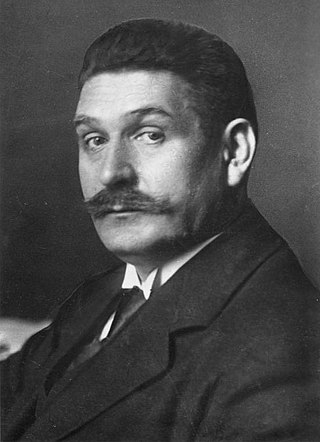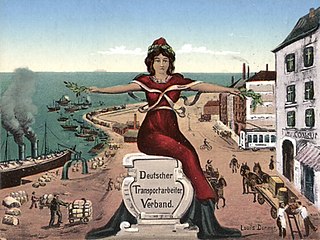Related Research Articles

Gustav Adolf Bauer was a German Social Democratic Party leader and the chancellor of Germany from June 1919 to March 1920. Prior to that, he was minister of labour in the last cabinet of the German Empire and during most of the German Revolution that preceded the formal establishment of the Weimar Republic.
The General Federation of Free Employees was an amalgamation of various socialist-oriented trade unions of technical and administrative employees in the Weimar Republic.
The General Commission of German Trade Unions was an umbrella body for German trade unions during the German Empire, from the end of the Anti-Socialist Laws in 1890 up to 1919. In 1919, a successor organisation was named the Allgemeiner Deutscher Gewerkschaftsbund, and then in 1949, the current Deutscher Gewerkschaftsbund was formed.

The German Transport Workers' Union was a trade union representing transport workers in Germany.

The German Wood Workers' Union was a trade union representing carpenters, joiners, and related workers, in Germany.

The Union of Municipal and State Workers was a trade union representing public sector workers in Germany.
The German Leather Workers' Union was a trade union representing workers involved in tanning and glovemaking.
The Union of Hairdressers and Assistants was a trade union representing workers in the hairdressing industry in Germany.

The General Union of Public Sector and Transport Workers was a trade union representing workers in various industries in Germany.
The Union of Brewery and Mill Workers and Kindred Trades was a trade union representing workers in the food and drink processing industry in Germany.
The Union of Coopers, Cellar Managers, and Helpers in Germany was a trade union representing coopers and those in related trades, in Germany.
The Union of Graphic Assistants of Germany was a trade union representing assistants in the printing trade in Germany.
The Union of Domestic Workers of Germany was a trade union representing domestic staff in Germany.
The International Artists' Lodge is a trade union section and former independent trade union, representing variety and circus performers in Germany.

The Central Union of Employees was a trade union representing white collar, private sector workers in Germany.
The Central Union of Potters was a trade union representing pottery workers in Germany.
The Union of Dockers of Germany was a trade union representing dock workers in Germany.
The Union of German Professional Firefighters was a trade union representing firefighters in Germany.
The Central Union of Commercial Employees was a trade union representing white collar commercial workers in Germany.
The Union of Bakers and Related Workers of Germany was a trade union representing workers in the baking industry in Germany.
References
- 1 2 Urban, Otto (1931). Zentralverband der Angestellten. ADGB. p. 2101–2106. Retrieved 19 June 2020.
- 1 2 "Bauer, Gustav (1870-1944)". Friedrich Ebert Stiftung. Retrieved 29 June 2020.
- ↑ "Giebel, Karl (1878 - 1930)". Friedrich Ebert Stiftung. Retrieved 29 June 2020.